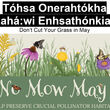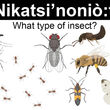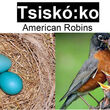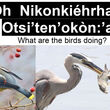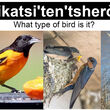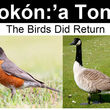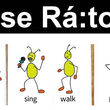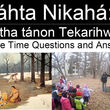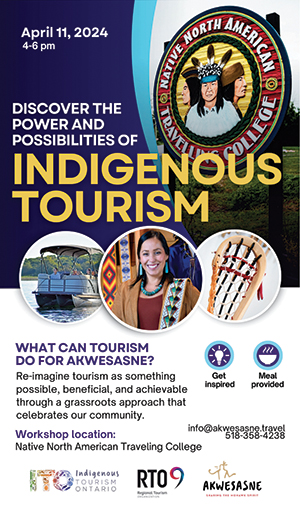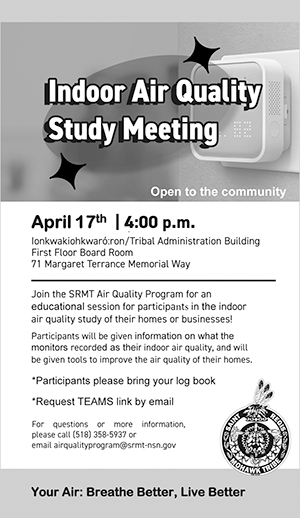Culture
Sorted by date Results 76 - 100 of 1587
Basic Call to Consciousness
Continued from last week. Internally, the law was to be the power by which the people were united ideologically and administratively under a dispute settlement process to which all had agreed to...
Tóhsa Onerahtókha Nikahá:wi Enhsathónkia'ke
1. Sheié:nawas sateweièn:ton iakotikhwanón:tens tsi kontì:teron Help preserve crucial pollinator habitat 2. Í:iah Onerahtókha nikahá:wi tekath...
Basic Call to Consciousness
Continued from last week “Righteousness” refers to something akin to the ideology of the people using their purest and most unselfish minds. It occurs when the people put their minds and emotions in...
Basic Call to Consciousness
Thoughts of Peace: The Great Law Haudenosaunee oral history related that long before the Europeans arrived, Native Peoples of the Northeast Woodlands had reached a crisis. It is said that during this...
Tsi Nahò:ten Konwatiiá'tstshon Ne Kaia'takéhson Ne Otsi'nonwa'shón:'a
4 na'tekaià:kon ne kaia'tà:ke It has 3 body parts on its body 2. 6 na'tekahsí:nonte ne kaia'tà:ke It has 6 legs attached on its body 3. Tek...
Basic Call to Consciousness
Continued from last week At about this time, the State of New York was attempting to negotiate its own treaties with our peoples. The settlers knew that our governing council would never relinquish...
Oh Nikatsi'noniò:ten?
7 na'tekahsí:nonte ne kaia'tà:ke ne iekaia'taié:ri The adult has 6 legs attached on its body 2. 3 na'tekaià:kon ne kaia'tà:ke It has 3 body part...
Basic Call to Consciousness
Akwesasne Notes The Haudenosaunee, more commonly known as the Iroquois Confederacy, are an ancient people of North America. Our tradition states that our people originate in the northeastern...
Tsiskó:ko
1. Skaià:ta tsiskó:ko o'nhéhkien One female robin 2. Kahon'tsistarà:ken It is lighter black in color 3. Kanekwenhtararà:ken ne niia...
An Iroquoian Story of Creation
Continued from last week. And they say that it’s not long after that, the Creator, that’s where Teharonhiawako, the holder of the skies, his name now changes to Shonkwaia’tison. He’s the one that cr...
Oh Nikonkiéhrha ne Otsi'ten'okòn:'a?
1. Kakhwatí:saks It is looking for food 2. Wà:iaks It eats berries 3. Wató:rats It is hunting 4. Ka'wà:raks It eats meat 5. Wanitsiató:rats It is h...
An Iroquoian Story of Creation
Continued from last week. So they say again, after that, not long after that, one day Teharonhiawako was down on the earth. And he’s all by himself now. And his brother Sawiskera is living up in h...
Oh Nikatsi'ten'tsherò:ten?
1. Akiarentà:'a Baltimore oriole 2. Ken'tarakonhá:ka Barn swallow 3. Tihkáhon Bittern 4. Terí:teri Blue jay 5. Akiaren'tà:'a Canary 6. Onek...
An Iroquoian Story of Creation
Continued from last week And they also say that they split the day at that time. And what that means is that the daylight hours would be the time that Teharonhiawako, the holder of the skied, would...
Otsi'ten'okón:'a Tontakón:ne
1. Kakwitè:ne nikahá:wi In springtime 2. Enkahniohkontón:nion ne okwire'shón:'a The trees will bud 3. Entkahontá:nio The grass will sprout 4. Nia'té:k...
An Iroquoian Story of Creation
Continued from last week And he understood what had happened when he thought back to the winter. And he went back to where his brother’s small dwelling was and he went in and grabbed him out. And h...
Tsi Nikahá:wi Tsi Shotonhnhé:ton Karihwanóntha tánon Tekarihwa'serákwas
1. Tekonnonhwará:tons tsi Shotonhnhé:ton Happy Easter 2. Wahsekhwá:ren kénh ne Shotonhnhé:ton Did you have an Easter dinner? 3. Hén, Shotonhnhé:ton ni...
An Iroquoian Story of Creation
Continued from last week And they say as they grew to be young men that in the wintertime they would take turns going out hunting, each one of these boys. One winter it would be Teharonhiawako’s t...
Só:se Rá:tons
1. Akwé:kon tewá'tshwaht! Let's all of us play a game! 2. Só:se rá:tons konwana'tónhkhwa It is called "Só:se Says" 3. Tóka' enkì:ron "Só:se rá:tons...
An Iroquoian Story of Creation
Continued from last issue And, they say, as the two young boys grew to be young men, they found that they had special gifts as well, and their special gift was one of creation. Each one of them had th...
Eniakhiienawá'se Ne Takò:s Ratí:tsihn
1. Enionkwaién:ta'ne ne iontetsièn:tshne ne takò:s ratí:tsihn raoná:wen We will have a clinic for male cats 2. Onerahtókha kaié:ri tánon wísk en...
An Iroquoian story of creation
Continued from last week And they say that because this young woman had lost her life giving birth, that there was a great force emitting from her in all directions, this life-giving force, and as...
Wáhta Nikahá:wi Karihwanóntha tánon Tekarihwa'serákwen
1. Oh nonkié:ren tsi tewarontahrá:raks ne wáhta nikakwirò:ten? Why do we tap maple trees? 2. Tewarontahrá:raks ne wáhta okwire'shòn:'a nè:'e tsi wah...
An Iroquoian story of creation
Continued from last week So again, as they say, “as the time went on”, this young woman, she had a dream. And they say, in this dream, she was approached by a handsome young man. And he said that he...
Khia'teiohserá:ke Katshé:nen Aota'karitéhtshera Tsi Tkonwatitsièn:tstha
1. Khia'teiohserá:ke katshé:nen enkonwanátken'se tsi tkonwatitsièn:tstha The annual pet wellness clinic 2. Kawehnohkowanén:ne enwaterihwahtén:ti Will...
